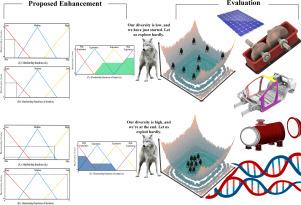The Fuzzified Grey Wolf: An improved grey wolf optimizer based on dynamic fuzzy system FGWO
IF 6.6
1区 计算机科学
Q1 COMPUTER SCIENCE, ARTIFICIAL INTELLIGENCE
引用次数: 0
Abstract
The Grey Wolf Optimizer (GWO) is a leading, powerful, and effective algorithm in swarm optimization techniques, showing competitive performance across various optimization problems. Yet, GWO is burdened by high tendencies toward exploitation and imprecise population diversity. This work introduces an improved GWO called the Fuzzified Grey Wolf Optimizer (FGWO) for solving global optimization problems. FGWO benefits from a dynamic fuzzy inference system (DFIS) to capture the optimal value of throughout iterations. DFIS integrates two inputs: the diversity rate and iteration number, and by inferring the optimal value of , FGOW determines whether to exploit or explore. Moreover, DFIS employs an adaptive membership function to capture the precise value of population diversity throughout the course of iteration. This optimal determination strategy can achieve a balanced exploitation–exploration ratio, mitigating premature convergence and enhancing diversity. FGWO is evaluated on CEC2017 benchmark functions, four engineering designs, and a breast cancer genes feature selection design. FGWO was compared with three other improved GWOs, and across all experiments, the outcomes demonstrate its superiority in terms of efficiency and applicability to real-world designed problems.

模糊化灰狼:一种基于动态模糊系统FGWO的改进灰狼优化器
灰狼优化器(Grey Wolf Optimizer, GWO)是群优化技术中领先的、强大的、有效的算法,在各种优化问题中表现出具有竞争力的性能。然而,GWO存在高度的开发倾向和不精确的人口多样性。这项工作引入了一种改进的GWO,称为模糊灰狼优化器(FGWO),用于解决全局优化问题。FGWO得益于动态模糊推理系统(DFIS)在整个迭代过程中捕获a→的最优值。DFIS集成了分集率和迭代次数两个输入,通过推断a→的最优值,FGOW决定是开发还是探索。此外,DFIS采用自适应隶属函数来捕获整个迭代过程中种群多样性的精确值。这种最优a→确定策略可以实现平衡的开采-勘探比,减少过早收敛,增强多样性。采用CEC2017基准函数、四项工程设计和一项乳腺癌基因特征选择设计对FGWO进行评估。将FGWO与其他三种改进的gwo进行了比较,在所有实验中,结果表明其在效率和对实际设计问题的适用性方面具有优势。
本文章由计算机程序翻译,如有差异,请以英文原文为准。
求助全文
约1分钟内获得全文
求助全文
来源期刊

Applied Soft Computing
工程技术-计算机:跨学科应用
CiteScore
15.80
自引率
6.90%
发文量
874
审稿时长
10.9 months
期刊介绍:
Applied Soft Computing is an international journal promoting an integrated view of soft computing to solve real life problems.The focus is to publish the highest quality research in application and convergence of the areas of Fuzzy Logic, Neural Networks, Evolutionary Computing, Rough Sets and other similar techniques to address real world complexities.
Applied Soft Computing is a rolling publication: articles are published as soon as the editor-in-chief has accepted them. Therefore, the web site will continuously be updated with new articles and the publication time will be short.
 求助内容:
求助内容: 应助结果提醒方式:
应助结果提醒方式:


